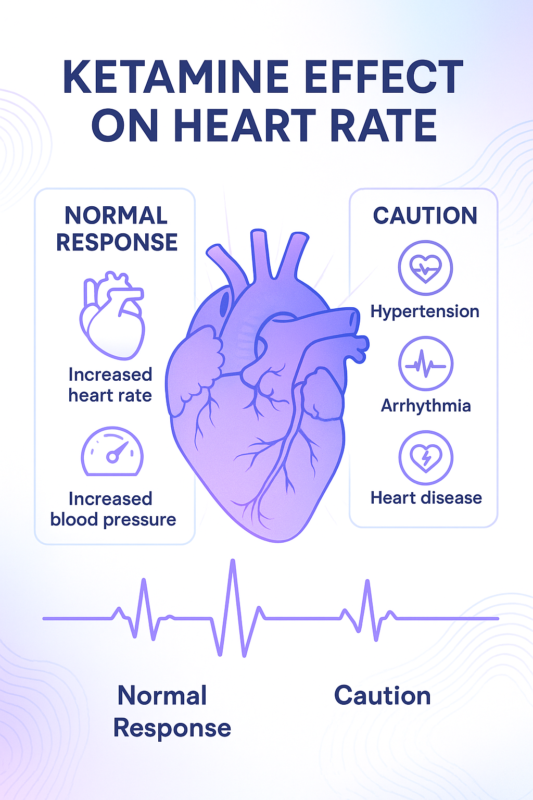
Ketamine Effect on Heart Rate: What You Need to Know
When people think of ketamine, they often picture its use in psychedelic therapy, pain management, or even as a controversial party substance. But one of the most important medical aspects that often gets overlooked is the effect of ketamine on heart rate.
As someone who has worked closely with clinicians and followed the evolving research around ketamine therapy, I know this isn’t just a detail—it’s a crucial piece of the safety puzzle. Whether you’re a patient considering ketamine-assisted psychotherapy, a medical professional administering infusions, or simply curious, understanding how ketamine influences cardiovascular function is key.
Why Ketamine and Heart Rate Matter
Heart rate is a direct indicator of how your cardiovascular system responds to stress, medication, or altered states. Ketamine, being a dissociative anesthetic and now a therapeutic tool for depression and PTSD, has sympathomimetic properties—meaning it can stimulate the sympathetic nervous system.
This stimulation can lead to:
- Increased heart rate (tachycardia)
- Elevated blood pressure
- In some cases, changes in rhythm
These effects are usually temporary, but depending on a person’s health history, they may have real implications.
The Science Behind Ketamine’s Cardiovascular Effects
Ketamine works by blocking NMDA (N-methyl-D-aspartate) receptors in the brain, altering glutamate transmission. This neurochemical shift creates the dissociative, analgesic, and psychedelic properties we associate with ketamine.
But here’s the cardiovascular twist:
- By stimulating the sympathetic nervous system, ketamine increases circulating catecholamines like adrenaline and noradrenaline.
- This causes the heart to beat faster and harder, raising cardiac output.
- Blood pressure typically rises, especially in the first 15–30 minutes after administration.
Most healthy individuals tolerate this surge without issue, but for people with hypertension, arrhythmias, or other heart conditions, ketamine’s effect on heart rate becomes a critical risk factor.
Clinical Observations
In medical settings, ketamine has been used safely for decades as an anesthetic—even in children. However, anesthesia teams closely monitor cardiovascular function because ketamine:
- Raises heart rate by 10–30 beats per minute in most patients.
- Raises blood pressure transiently, with systolic pressure sometimes climbing by 20–30 mmHg.
- Can induce arrhythmias in vulnerable populations.
In ketamine infusion therapy for depression, the doses are much lower than anesthetic levels. Still, clinicians often monitor heart rate, blood pressure, and oxygen saturation throughout the session.
Ketamine in Therapy: Should You Be Concerned?
For most healthy adults, the ketamine effect on heart rate is not dangerous. It may feel like your heart is beating faster, but this usually subsides within an hour of treatment.
When to be cautious:
- Pre-existing heart disease: Patients with arrhythmias, coronary artery disease, or uncontrolled hypertension should proceed only under strict medical supervision.
- Elderly patients: Age often brings underlying cardiovascular risks.
- Polydrug use: Combining ketamine with stimulants (like cocaine or amphetamines) can dangerously amplify heart strain.
What Patients Should Expect
If you’re scheduled for a ketamine infusion or nasal spray therapy:
- Pre-treatment screening: Your provider should check blood pressure, heart rate, and medical history.
- Monitoring during treatment: Expect to be connected to a monitor for pulse and BP tracking.
- Aftercare: Providers typically keep patients under observation until vitals return to baseline.
Many patients describe the increased heart rate as mild and manageable, often overshadowed by the dissociative or therapeutic effects of ketamine itself.
Lifestyle and Safety Tips
If you’re concerned about ketamine’s effect on heart rate, here are a few practical steps:
- Hydrate beforehand: Mild dehydration can amplify cardiovascular effects.
- Avoid caffeine and stimulants: They can increase heart rate further.
- Practice deep breathing: Slow breathing helps counteract sympathetic activation.
- Share your health history honestly: Don’t skip details about heart conditions or medications.
Ketamine vs Other Psychedelics on Heart Rate
For context, it’s useful to compare ketamine with other substances:
- Psilocybin (magic mushrooms): Typically causes a mild increase in heart rate and blood pressure.
- LSD: Similar to psilocybin but with more variability depending on dose and mindset.
- MDMA: Much stronger cardiovascular stimulation than ketamine, often doubling resting heart rate in sensitive users.
Ketamine’s cardiovascular profile is considered moderate but still requires medical oversight.
Final Thoughts: Balancing Risk and Benefit
The ketamine effect on heart rate is a well-documented, manageable side effect when therapy is conducted responsibly. For the majority of healthy patients, the temporary cardiovascular stimulation is mild and not cause for alarm.
But for individuals with heart conditions, it underscores why professional medical supervision is non-negotiable. Ketamine therapy holds immense promise for treatment-resistant depression, PTSD, and chronic pain. Its benefits often outweigh the risks—as long as heart health is respected and monitored.